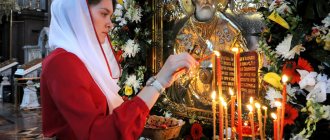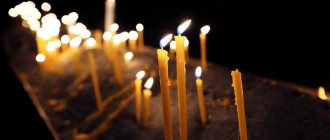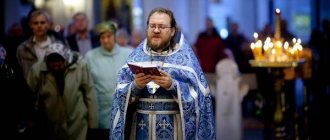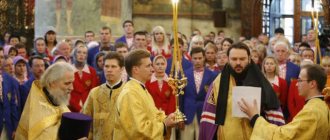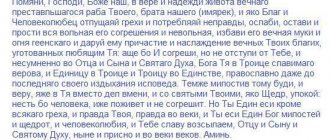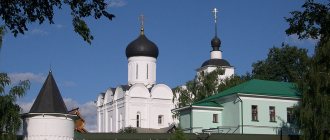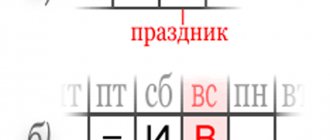The afterlife of people
According to the teachings of the Orthodox Church, only at the Last Judgment will the afterlife fate of all people be finally determined. For this reason, the prayers of the living can have a beneficial effect on the fate of those who have already died. Including magpie for the repose.
Sorokoust for repose at Proskomedia
“The deceased need our prayer, because they themselves cannot do anything for themselves, but we can. The dead need prayer more than the living, because for the living there is still hope of repentance. And God wants there to be people who ask Him for the departed, because the final Judgment has not yet occurred” (St. Paisius the Svyatogorets, 1924-1994).
Origin story
In ancient Rus', in large cities, parishes were divided into so-called “magpies”, similar to modern dean districts. In each such “forty” there were forty churches, counting all the side chapels, which all had their own special clergy, “altar priests”. In such a forty, on one day it was possible to perform the entire forty, all forty liturgies, serving them in all churches of a given forty.
According to the remark of the historian of the Russian church, Professor E. E. Golubinsky (1834-1912), “Sorokoust actually means service in forty churches on the day of remembrance” (3rd, 9th, 40th after death).
Golubinsky E., prof., History of the Russian Church, second period, vol. II
The emergence of the tradition of praying for the dead
This attitude towards the afterlife existed even in the times of the Old Testament. Before the coming of Jesus Christ into the world, His death on the Cross and Resurrection, all dead people were doomed, albeit to varying degrees, to a sad and joyless afterlife fate. After all, the doors of heaven were closed to human souls after Adam was expelled from heaven. But even then there was prayer for the dead.
An example is the prayer of the Jewish people for those killed during the battle with the Edomites (Second Book of Maccabees, 12:39–45). Amulets of pagan gods (trophies) were found under the clothes of the killed Jewish soldiers. For God’s chosen people, such an act was sinful, and therefore the guilty perished. But the valiant warrior Judas Maccabee collected funds and sent them to the Jerusalem Temple. There, a sin sacrifice was offered to God for the lost. As the Holy Scripture says, Judas Maccabee “acted very well and piously, thinking about the resurrection.” He showed concern for the forgiveness of the sins of his fallen brothers on the Day of Judgment. “Therefore he offered a propitiatory sacrifice for the dead, that they might be freed from sin” (Second Maccabees 12:45).
This indicates a pre-existing tradition of praying and making sacrifices for the dead. Such a prayer was prophetic in nature, testifying to the hope of salvation in the future. Then she could not change the afterlife fate of the souls of dead people. Only in New Testament times did prayer for the dead acquire effective force.
“There is no doubt that only the Lord can determine a person’s fate after death. And there is no doubt that this fate directly depends on the image of faith and life of a person on earth. But there is also no doubt that it is possible and even necessary to pray for our family and friends, asking the Lord to forgive their sins. And there is no doubt that these prayers are not in vain. If we only try to listen to the Lord ourselves and live according to His commandments” (priest Dmitry Shishkin).
Church of the New Martyrs and Confessors of Russia in Strogino
REMEMBRANCE OF THE DEAD
Why do people die?
- “God did not create death and does not rejoice in the destruction of the living, for He created everything for existence” (Wis. 1:13-14). Death appeared as a result of the fall of the first people. “Righteousness is immortal, but unrighteousness causes death: the wicked attracted her with hands and words, considered her a friend and wasted away, and made a covenant with her, for they are worthy to be her lot” (Wis. 1:15-16).
To understand the issue of mortality, it is necessary to distinguish between spiritual and physical death. Spiritual death is the separation of the soul from God, Who for the soul is the Source of eternal joyful existence. This death is the most terrible consequence of the Fall of man. A person gets rid of it in Baptism.
Although physical death after Baptism remains in a person, it takes on a different meaning. From punishment, it becomes the door to heaven (for people who were not only baptized, but also lived in a manner pleasing to God) and it is already called the “dormition.”
What happens to the soul after death?
— According to Church Tradition, based on the words of Christ, the souls of the righteous are carried by angels to the threshold of heaven, where they remain until the Last Judgment, expecting eternal bliss: “The beggar died and was carried by the angels to Abraham’s bosom” (Luke 16:22). The souls of sinners fall into the hands of demons and are “in hell, in torment” (see Luke 16:23). The final division into the saved and the condemned will occur at the Last Judgment, when “many of those sleeping in the dust of the earth will awaken, some to eternal life, others to eternal reproach and shame” (Dan. 12:2). In the parable of the Last Judgment, Christ speaks in detail about the fact that sinners who did not do deeds of mercy will be condemned, and the righteous who did such deeds will be justified: “And these will go away into eternal punishment, but the righteous into eternal life” (Matthew 25). :46).
What do the 3rd, 9th, 40th days after the death of a person mean? What should you do these days?
- Holy Tradition preaches to us from the words of holy ascetics of faith and piety about the mystery of testing the soul after its departure from the body. For the first two days, the soul of a deceased person remains on earth and, with the Angel accompanying it, walks through those places that attract it with memories of earthly joys and sorrows, good deeds and evil ones. This is how the soul spends the first two days, but on the third day the Lord, in the image of His three-day Resurrection, commands the soul to ascend to heaven to worship Him - the God of all. On this day, the church commemoration of the soul of the deceased, who appeared before God, is timely.
Then the soul, accompanied by an Angel, enters the heavenly abodes and contemplates their indescribable beauty. The soul remains in this state for six days - from the third to the ninth. On the ninth day, the Lord commands the Angels to again present the soul to Him for worship. The soul stands before the Throne of the Most High with fear and trembling. But even at this time, the Holy Church again prays for the deceased, asking the Merciful Judge to place the soul of the deceased with the saints.
After the second worship of the Lord, the Angels take the soul to hell, and it contemplates the cruel torment of unrepentant sinners. On the fortieth day after death, the soul ascends for the third time to the Throne of God. Now her fate is being decided - she is assigned a certain place, which she has been awarded due to her deeds. That is why church prayers and commemorations on this day are so timely. They ask for forgiveness of sins and the inclusion of the soul of the deceased in paradise with the saints. On these days, the Church celebrates memorial services and litias.
The Church commemorates the deceased on the 3rd day after his death in honor of the three-day Resurrection of Jesus Christ and in the image of the Holy Trinity. Commemoration on the 9th day is performed in honor of the nine ranks of angels, who, as servants of the Heavenly King and representatives to Him, petition for pardon for the deceased. The commemoration on the 40th day, according to the tradition of the apostles, is based on the forty-day cry of the Israelis about the death of Moses. In addition, it is known that the forty-day period is very significant in the history and Tradition of the Church as the time necessary for preparing and receiving a special Divine gift, for receiving the gracious help of the Heavenly Father. Thus, the prophet Moses was honored to talk with God on Mount Sinai and receive the tablets of the Law from Him only after a forty-day fast. The prophet Elijah reached Mount Horeb after forty days. The Israelites reached the promised land after forty years of wandering in the desert. Our Lord Jesus Christ Himself ascended into heaven on the fortieth day after His Resurrection. Taking all this as a basis, the Church established the commemoration of the departed on the 40th day after their death, so that the soul of the deceased would ascend the holy mountain of Heavenly Sinai, be rewarded with the sight of God, achieve the bliss promised to it and settle in the heavenly villages with the righteous.
On all these days, it is very important to order the commemoration of the deceased in the Church, submitting notes for commemoration at the Liturgy and memorial service.
What soul does not go through ordeals after death?
- From the Holy Tradition it is known that even the Mother of God, having received notification from the Archangel Gabriel about the approaching hour of Her relocation to heaven, prostrated herself before the Lord, humbly begged Him so that, at the hour of the exodus of Her soul, She would not see the prince of darkness and hellish monsters, but so that the Lord Himself would accept Her soul into His Divine embrace. It is all the more useful for the sinful human race to think not about who does not go through ordeals, but about how to go through them, and do everything to cleanse the conscience and correct life according to the commandments of God. “The essence of everything: fear God and keep His commandments, because this is everything for man; For God will bring every work into judgment, even every secret thing, whether it is good or evil” (Eccl. 12:13-14).
What concept of heaven should you have?
— Heaven is not so much a place as a state of mind; just as hell is suffering stemming from the inability to love and non-participation in the Divine light, so heaven is the bliss of the soul stemming from the excess of love and light, to which the one who has united with Christ fully and completely participates. This is not contradicted by the fact that heaven is described as a place with various “abodes” and “chambers”; all descriptions of paradise are only attempts to express in human language that which is inexpressible and surpasses the human mind.
In the Bible, "paradise" is the garden where God placed man; The same word in the ancient church tradition was used to describe the future bliss of people redeemed and saved by Christ. It is also called the “Kingdom of Heaven,” “the life of the age to come,” “the eighth day,” “the new heaven,” “the heavenly Jerusalem.” The Holy Apostle John the Theologian says: “I saw a new heaven and a new earth, for the first heaven and the first earth had passed away, and the sea was no more. And I, John, saw the holy city Jerusalem, new, coming down from God out of heaven, prepared as a bride adorned for her husband. And I heard a loud voice from heaven, saying: Behold, the tabernacle of God is with men, and He will dwell with them; they will be His people, and God Himself with them will be their God. And God will wipe away every tear from their eyes, and there will be no more death; There will be no more crying, no crying, no pain, for the former things have passed away. And He who sat on the throne said: Behold, I am creating all things new... I am Alpha and Omega, the beginning and the end; to the thirsty I will give freely from the fountain of living water... And the angel took me up in the spirit to a great and high mountain, and showed me the great city, holy Jerusalem, which came down from heaven from God. It has the glory of God... But I did not see a temple in it, for the Lord God Almighty is its temple, and the Lamb. And the city has no need of either the sun or the moon for its illumination; for the glory of God has illuminated it, and its lamp is the Lamb. The saved nations will walk in its light...And nothing unclean will enter into it, nor anyone who practices abomination and lies, but only those who are written in the Lamb’s book of life” (Rev. 21:1-6,10,22-24,27 ). This is the earliest description of heaven in Christian literature.
When reading descriptions of paradise found in theological literature, it is necessary to keep in mind that many Church Fathers talk about the paradise that they saw, into which they were caught up by the power of the Holy Spirit. In all descriptions of paradise, it is emphasized that earthly words can only to a small extent depict heavenly beauty, since it is “inexpressible” and surpasses human comprehension. It also speaks of the “many mansions” of paradise (John 14:2), that is, of different degrees of bliss. “God will honor some with great honors, others with less,” says St. Basil the Great, “because “star differs from star in glory” (1 Cor. 15:41). And since the Father “has many mansions,” He will rest some in a more excellent and higher state, and others in a lower state.” However, for everyone, his “abode” will be the highest fullness of bliss available to him - in accordance with how close he is to God in earthly life. “All the saints who are in paradise will see and know one another, and Christ will see and fill everyone,” says St. Simeon the New Theologian.
What concept should you have of hell?
- There is no person deprived of the love of God, and there is no place that is not involved in this love; however, everyone who has made a choice in favor of evil voluntarily deprives himself of God's mercy. Love, which for the righteous in heaven is a source of bliss and consolation, for sinners in hell becomes a source of torment, since they recognize themselves as not participating in love. According to Saint Isaac, “the torment of Gehenna is repentance.”
According to the teachings of the Venerable Simeon the New Theologian, the main reason for a person’s torment in hell is an acute sense of separation from God: “None of the people who believe in You, Master,” writes the Venerable Simeon, “none of those baptized in Your name will endure this great and the terrible severity of separation from You, Merciful One, because this is terrible sorrow, unbearable, terrible and eternal sadness.” If on earth, says the Monk Simeon, those who are not involved in God have bodily pleasures, then there, outside the body, they will experience one incessant torment. And all the images of hellish torment that exist in world literature - fire, cold, thirst, red-hot ovens, lakes of fire, etc. - are only symbols of suffering, which comes from the fact that a person feels not involved in God.
For an Orthodox Christian, the thought of hell and eternal torment is inextricably linked with the mystery that is revealed in the services of Holy Week and Easter - the mystery of Christ’s descent into hell and the deliverance of those there from the dominion of evil and death. The Church believes that after His death, Christ descended into the abysses of hell in order to abolish hell and death, to destroy the terrible kingdom of the devil. Just as by entering the waters of the Jordan at the moment of His Baptism, Christ sanctifies these waters, filled with human sin, so by descending into hell, He illuminates it with the light of His presence to the last depths and limits, so that hell can no longer tolerate the power of God and perishes. Saint John Chrysostom in the Easter Catechetical Sermon says: “Hell was upset when it met You; he was grieved because he was abolished; he was upset because he was ridiculed; he was grieved because he was killed; I was upset because I was deposed.” This does not mean that hell no longer exists at all after the Resurrection of Christ: it exists, but the death sentence has already been passed on it.
Every Sunday, Orthodox Christians hear hymns dedicated to the victory of Christ over death: “The council of angels was surprised, in vain you were imputed to the dead, but the mortal fortress, O Savior, was destroyed... and freed all from hell” (from hell, who freed everyone). Deliverance from hell, however, should not be understood as some kind of magical action performed by Christ against the will of man: for one who consciously rejects Christ and eternal life, hell continues to exist as suffering and the torment of abandonment by God.
How to cope with grief when a loved one dies?
- The grief of separation from the deceased can be satisfied only by prayer for him. Christianity does not perceive death as the end. Death is the beginning of a new life, and earthly life is only a preparation for it. Man was created for eternity; in paradise he fed from the “tree of life” (Gen. 2:9) and was immortal. But after the Fall, the path to the tree of life was blocked and man became mortal and corruptible.
But life does not end with death, the death of the body is not the death of the soul, the soul is immortal. Therefore, it is necessary to see off the soul of the deceased with prayer. “Do not give up your heart to sorrow; move her away from you, remembering the end. Do not forget this, for there is no return; and you will not bring him any benefit, but will harm yourself... With the repose of the deceased, soothe the memory of him, and take comfort in him after the outcome of his soul” (Sir. 38:20-21,23).
What should you do if, after the death of a loved one, you are tormented by your conscience about the wrong attitude towards him during life?
— The voice of conscience denouncing guilt subsides and ceases after sincere heartfelt repentance and confession to God to the priest of one’s sinfulness towards the deceased. It is important to remember that with God everyone is alive and the commandment of love also applies to the dead. The deceased are in great need of the prayerful help of the living and alms given for them. A person who loves will pray, give alms, submit church notes for the repose of the departed, strive to live in a manner pleasing to God, so that God will show His mercy for them.
If you constantly remain in active concern for others and do good to them, then not only peace will be established in your soul, but deep satisfaction and joy.
What to do if you dream of a dead person?
- You don’t need to pay attention to dreams. However, we should not forget that the eternally living soul of the deceased experiences a great need for constant prayer for it, because it itself can no longer do good deeds with which it would be able to appease God. Therefore, prayer in church and at home for deceased loved ones is the duty of every Orthodox Christian.
How many days do people mourn for the deceased?
— There is a tradition of mourning for forty days for a deceased loved one. According to the Tradition of the Church, on the fortieth day the soul of the deceased receives a certain place in which it will remain until the time of the Last Judgment of God. That is why, until the fortieth day, intense prayer is required for the forgiveness of the sins of the deceased, and the external wearing of mourning is intended to promote internal concentration and attention to prayer, and to prevent active involvement in previous everyday affairs. But you can have a prayerful attitude without wearing black clothes. The internal is more important than the external.
Who is the newly deceased and ever-memorable?
— Newly deceased in church tradition refers to a deceased person within forty days after death. The day of death is considered first, even if death occurred a few minutes before midnight. On the 40th day of the Church, God (at the private judgment of the soul) determines its afterlife fate until the general Last Judgment prophetically promised by the Savior (see Matt. 25:31-46).
A person is usually called eternally remembered after forty days after his death. Ever-memorable - the word “ever-memorable” means always. And the ever-memorable one is always remembered, that is, the one for whom they always remember and pray. In funeral notes, they sometimes write “of everlasting memory” before the name when the next anniversary of the death of the deceased(s) is celebrated.
How is the last kiss of the deceased performed? Do I need to be baptized at the same time?
— A farewell kiss to the deceased occurs after his funeral service in the church. They kiss the aureole placed on the forehead of the deceased, or apply it to the icon in his hands. At the same time, they are baptized on the icon.
What to do with the icon that was in the hands of the deceased during the funeral service?
— After the funeral service for the deceased, the icon can be taken home or left in the church.
What can be done for the deceased if he was buried without a funeral service?
— If he was baptized in the Orthodox Church, then you need to come to the church and order an absentee funeral service, as well as order magpies, memorial services and pray for him at home.
How to help the deceased?
— It is possible to alleviate the fate of the deceased if you perform frequent prayers for him and give alms. It is good to work for the Church in memory of the deceased, for example, in a monastery.
Why is the remembrance of the dead performed?
— Prayer for those who have passed from temporary life to eternal life is an ancient tradition of the Church, sanctified by centuries. Leaving the body, a person leaves the visible world, but he does not leave the Church, but remains its member, and it is the duty of those remaining on earth to pray for him. The Church believes that prayer eases a person’s posthumous fate. While a person is alive, he is able to repent of sins and do good. But after death this possibility disappears, only hope remains in the prayers of the living. After the death of the body and private judgment, the soul is on the threshold of eternal bliss or eternal torment. It depends on how the short earthly life was lived. But much depends on prayer for the deceased. The lives of the holy saints of God contain many examples of how, through the prayer of the righteous, the posthumous fate of sinners was eased - right up to their complete justification.
Is it possible to cremate the deceased?
— Cremation is a custom alien to Orthodoxy, borrowed from Eastern cults and spread as the norm in a secular (non-religious) society during the Soviet period. Therefore, the relatives of the deceased, if possible to avoid cremation, should prefer burying the deceased in the ground. There is no prohibition in the sacred books to burn the bodies of the dead, but there are positive indications from Christian doctrine of another way of burying bodies - this is burying them in the earth (see: Gen. 3:19; John 5:28; Matt. 27:59-60). This method of burial, accepted by the Church from the very beginning of its existence and sanctified by it with a special rite, stands in connection with the entire Christian worldview and with its very essence - the belief in the resurrection of the dead. According to the strength of this faith, burial in the ground is an image of the temporary euthanization of the deceased, for whom the grave in the bowels of the earth is a natural bed of repose and who is therefore called by the Church the deceased (and in worldly terms, the deceased) until the resurrection. And if the burial of the bodies of the dead instills and strengthens the Christian faith in the resurrection, then the burning of the dead is easily related to the anti-Christian doctrine of non-existence.
The Gospel describes the burial order of the Lord Jesus Christ, which consisted of washing His Most Pure Body, dressing in special funeral clothes and placing in the grave (Matthew 27:59-60; Mark 15:46; 16:1; Luke 23:53 ; 24:1; John 19:39-42). The same actions are supposed to be performed on deceased Christians in the present time.
Cremation may be permissible in exceptional cases when there is no way to bury the body of the deceased.
Is it true that on the 40th day, the commemoration of the deceased must be ordered in three churches at once, or in one, but three services in succession?
— Immediately after death, it is customary to order magpies from the Church. This is a daily intensified commemoration of the newly deceased during the first forty days - until the private trial, which determines the fate of the soul beyond the grave. After forty days, it is good to order an annual commemoration and then renew it every year. You can also order longer-term commemorations in monasteries. There is a pious custom - to order commemoration in several monasteries and churches (their number does not matter). The more prayer books there are for the deceased, the better.
What is eve?
— Kanun (or eve) is a special table of a square or rectangular shape, on which there is a Cross with a Crucifix and holes for candles. Before the eve there are funeral services. Here you can light candles and put food to commemorate the dead.
Why do you need to bring food to the temple?
— Believers bring various foods to the temple so that the ministers of the Church will remember the departed at a meal. These offerings serve as donations, alms for those who have passed away. In former times, in the courtyard of the house where the deceased was, on the most significant days for the soul (3rd, 9th, 40th) funeral tables were set, at which the poor, homeless, and orphans were fed, so that there would be many people praying for the deceased. For prayer and, especially for alms, many sins are forgiven, and the afterlife is made easier. Then these memorial tables began to be placed in churches on the days of the universal remembrance of all Christians who have died since the ages for the same purpose - to remember the departed.
What foods can you put on the eve?
— The products can be any. It is prohibited to bring meat food into the temple.
Which commemoration of the dead is the most important?
—Prayers at the Liturgy have special power. The Church prays for all the departed, including those in hell. One of the kneeling prayers read on the feast of Pentecost contains a petition “for those kept in hell” and for the Lord to rest them “in a brighter place.” The Church believes that through the prayers of the living, God can alleviate the afterlife fate of the dead, saving them from torment and worthy of salvation with the saints.
Therefore, it is necessary, in the coming days after the death, to order a magpie in the church, that is, a commemoration at forty Liturgies: the Bloodless Sacrifice is offered forty times for the deceased, a particle is taken from the prosphora and immersed in the Blood of Christ with a prayer for the forgiveness of the sins of the newly deceased. This is a feat of love from the entirety of the Orthodox Church in the person of the priest who celebrates the Liturgy for the sake of the people commemorated at the proskomedia. This is the most necessary thing that can be done for the soul of the deceased.
What is Parents' Saturday?
— On certain Saturdays of the year, the Church commemorates all previously deceased Christians. The memorial services that take place on such days are called ecumenical, and the days themselves are called Ecumenical Parental Saturdays. On the morning of Parents' Saturdays, during the Liturgy, all previously deceased Christians are remembered. On the eve of parental Saturday, on Friday evening, parastas is served (translated from Greek as “presence”, “intercession”, “intercession”) - the continuation of the great requiem for all deceased Orthodox Christians.
When are Parents' Saturdays?
— Almost all parental Saturdays do not have a fixed date, but are associated with the moving day of Easter celebration. Meat Saturday occurs eight days before the start of Lent. Parents' Saturdays occur on the 2nd, 3rd and 4th weeks of Lent. Trinity Parental Saturday - on the eve of the Holy Trinity, on the ninth day after the Ascension. On the Saturday preceding the day of remembrance of the Great Martyr Demetrius of Thessalonica (November 8, new style) there is Dimitrievskaya Parental Saturday.
Is it possible to pray for repose after parental Saturday?
- Yes, you can and should pray for the repose of the deceased even after parental Saturdays. This is the duty of the living to the dead and an expression of love for them. The deceased themselves can no longer help themselves, they cannot bear the fruits of repentance or give alms. This is evidenced by the Gospel parable of the rich man and Lazarus (Luke 16:19-31). Death is not a departure into oblivion, but the continuation of the existence of the soul in eternity, with all its characteristics, weaknesses and passions. Therefore, the deceased (except for the saints glorified by the Church) need prayerful commemoration.
Saturday days (except for Great Saturday, Saturday of Bright Week and Saturdays coinciding with the twelve, great and temple holidays) in the church calendar are traditionally considered days of special remembrance of the dead. But you can pray for the departed and submit notes in the church on any day of the year, even when, according to the charter of the Church, no memorial services are served; in this case, the names of the deceased are remembered at the altar.
What other days of remembrance of the dead are there?
- Radonitsa - nine days after Easter, on Tuesday after Bright Week. On Radonitsa they share the joy of the Resurrection of the Lord with the deceased, expressing hope for their resurrection. The Savior Himself descended into hell to preach victory over death and brought from there the souls of the Old Testament righteous. Because of this great spiritual joy, the day of this commemoration is called “Rainbow”, or “Radonitsa”.
Special commemoration of all those who died during the Great Patriotic War of 1941-1945. established by the Church on May 9. Warriors killed on the battlefield are also remembered on the day of the Beheading of John the Baptist on September 11, according to the new style.
Is it necessary to go to the cemetery on the anniversary of the death of a close relative?
— The main days of remembrance of the deceased are the anniversaries of death and namesake. On the anniversary of the death of the deceased, relatives close to him pray for him, thereby expressing the belief that the day of a person’s death is not a day of destruction, but of a new birth for eternal life; the day of the transition of the immortal human soul to other conditions of life, where there is no longer any place for earthly illnesses, sorrows and sighs.
On this day it is good to visit the cemetery, but first you should come to the church at the beginning of the service, submit a note with the name of the deceased for commemoration at the altar (better if it is commemorated at a proskomedia), at a memorial service and, if possible, pray during the service.
Is it necessary to go to the cemetery on Easter, Trinity, and Holy Spirit Day?
- Sundays and holidays should be spent in prayer in the temple of God, and for visiting the cemetery there are special days of remembrance of the dead - parental Saturdays, Radonitsa, as well as anniversaries of death and namesake days of the deceased.
What to do when visiting a cemetery?
— Arriving at the cemetery, you need to clean up the grave. You can light a candle. If possible, invite a priest to perform the litia. If this is not possible, then you can read the short rite of the lithium yourself, having first purchased the corresponding brochure in a church or Orthodox store. If you wish, you can read an akathist about the repose of the departed. Just be silent, remember the deceased.
Is it possible to have a “wake” in a cemetery?
- Apart from the kutia consecrated in the temple, you should not eat or drink anything in the cemetery. It is especially unacceptable to pour vodka into a grave mound - this insults the memory of the deceased. The custom of leaving a glass of vodka and a piece of bread at the grave “for the deceased” is a relic of paganism and should not be observed by the Orthodox. There is no need to leave food on the grave - it is better to give it to the beggar or the hungry.
What should you eat at a “wake”?
“According to tradition, after the burial, a memorial table is assembled. The funeral meal is a continuation of the service and prayer for the deceased. The funeral meal begins with eating the kutia brought from the temple. Kutia or kolivo is boiled grains of wheat or rice with honey. Also traditionally they eat pancakes and sweet jelly. On a fast day, food should be lean. The funeral meal should be distinguished from a noisy feast by reverent silence and kind words about the deceased.
Unfortunately, the bad custom of remembering the deceased with vodka and a hearty snack has taken root. The same thing is repeated on the ninth and fortieth days. This is wrong, since the newly departed soul these days craves special fervent prayer for her to God and certainly not drinking wine.
Is it possible to place a photograph of the deceased on a grave cross?
— A cemetery is a special place where the bodies of those who have passed on to another life are buried. Visible evidence of this is the tombstone cross, which is erected as a sign of the redemptive victory of the Lord Jesus Christ over death. Just as the Savior of the world was resurrected, having accepted death for people on the cross, so all the dead will be resurrected physically. People come to the cemetery to pray for them in this place of rest for the dead. A photograph on a grave cross often encourages reminiscence rather than prayer.
With the adoption of Christianity in Rus', the deceased were placed either in stone sarcophagi, with a cross depicted on the lid, or in the ground. A cross was placed on the grave. After 1917, when the destruction of Orthodox traditions became systematic, columns with photographs began to be placed on graves instead of crosses. Sometimes monuments were erected and a portrait of the deceased was attached to them. After the war, monuments with a star and a photograph began to predominate as a headstone. In the last decade and a half, crosses have increasingly begun to appear in cemeteries. The practice of placing photographs on crosses has been preserved from past Soviet decades.
Is it possible to take a dog with you when visiting a cemetery?
— Of course, it’s not worth taking a dog to a cemetery for walking. But if necessary, for example, a guide dog for a blind person or for the purpose of protection when visiting a remote cemetery, you can take it with you. The dog should not be allowed to run over the graves.
What to read for the deceased during Easter week?
- If a person died on Bright Week (from the day of Holy Easter to Saturday of Bright Week inclusive), then the Easter canon is read. Instead of the Psalter, on Bright Week the Acts of the Holy Apostles are read.
Is it necessary to serve a memorial service for a baby?
- Dead babies are buried and memorial services are served for them, but in prayers they do not ask for forgiveness of sins, since babies do not consciously commit sins, but they ask the Lord to vouchsafe them the Kingdom of Heaven.
Is it possible to perform a funeral service in absentia for someone who died during the war if the place of his burial is unknown?
— If the deceased was baptized, then the funeral service can be performed in absentia, and the soil received after the funeral in absentia can be sprinkled in a cross shape on any grave in the Orthodox cemetery.
The tradition of performing a funeral service in absentia appeared in the 20th century in Russia due to the large number of those killed in the war, and since it was often impossible to perform a funeral service over the body of the deceased due to the lack of churches and priests, due to the persecution of the Church and persecution of believers. There are also cases of tragic death when it is impossible to find the body of the deceased. In such cases, a funeral service in absentia is permissible.
Is it possible to order a memorial service for an unburied deceased?
— Funeral services can be ordered if the deceased was a baptized Orthodox person and not one of the suicide victims. The Church does not commemorate the unbaptized and suicides.
If it becomes known that the buried person was not buried according to the Orthodox rite, then he must be buried in absentia. During the funeral service, in contrast to the requiem service, the priest reads a special prayer for the forgiveness of the sins of the deceased.
It is important not only to “order” a memorial service and funeral service, but for the relatives and friends of the deceased to take part in them prayerfully.
Is it possible to perform a funeral service for a suicide and pray for his repose at home and in church?
— In exceptional cases, after consideration of all the circumstances of suicide by the ruling bishop of the diocese, an absentee funeral service may be blessed. To do this, relevant documents and a written petition are submitted to the ruling bishop, where, with special responsibility for one’s words, all known circumstances and reasons for suicide are indicated. All cases are considered individually. When the bishop allows the funeral service in absentia, the temple prayer for repose becomes possible.
In all cases, for the prayerful consolation of the relatives and friends of a person who has committed suicide, a special prayer rite has been developed, which can be performed whenever the relatives of a person who has committed suicide turn to the priest for consolation in the grief that has befallen them.
In addition to performing this rite, relatives and friends can, with the blessing of the priest, read at home the prayer of the Venerable Elder Leo of Optina: “Seek, O Lord, the lost soul of Thy servant (name): if it is possible, have mercy. Your destinies are unsearchable. Do not make this my prayer a sin, but Thy holy will be done” and give alms.
Is it true that suicides are commemorated on Radonitsa? What to do if, believing this, they regularly submitted notes to the temple commemorating suicides?
- No, that's not true. If a person, out of ignorance, submitted notes to commemorate suicides (the funeral service of which was not blessed by the ruling bishop), then he must repent of this in confession and not do this again. All doubtful questions should be resolved with the priest, and not believe rumors.
Is it possible to order a memorial service for the deceased if he is Catholic?
- Private, cell (home) prayer for a non-Orthodox deceased is not prohibited - you can remember him at home, read psalms at the grave. In churches, funeral services are not performed or commemorated for those who never belonged to the Orthodox Church: non-Christians and all those who died unbaptized. The funeral service and requiem service were compiled taking into account the fact that the deceased and the funeral service were a faithful member of the Orthodox Church.
Is it possible to submit notes in church about the remembrance of the deceased who have not been baptized?
— Liturgical prayer is prayer for the children of the Church. In the Orthodox Church, it is not customary to remember unbaptized Christians, as well as non-Orthodox Christians, at proskomedia (the preparatory part of the Liturgy). This, however, does not mean that you cannot pray for them at all. Cell (home) prayer for such deceased is possible. Christians believe that prayer can provide great help to the dead. True Orthodoxy breathes the spirit of love, mercy and condescension towards all people, including those outside the Orthodox Church.
The Church cannot remember the unbaptized for the reason that they lived and died outside the Church - they were not its members, were not reborn to a new, spiritual life in the Sacrament of Baptism, did not confess the Lord Jesus Christ and cannot be involved in the benefits that He promised to those who love Him.
For the relief of the fate of the souls of the dead who were not worthy of Holy Baptism, and of infants who died in the womb or during childbirth, Orthodox Christians pray at home and read the canon to the holy martyr Uar, who has the grace from God to intercede for the dead who were not worthy of Holy Baptism. From the life of the holy martyr Uar, it is known that through his intercession he delivered from eternal torment the relatives of the pious Cleopatra, who revered him, who were pagans.
They say that those who die on Bright Week receive the Kingdom of Heaven. Is it so?
- The posthumous fate of the dead is known only to the Lord. “Just as you do not know the way of the wind and how the bones are formed in the womb of a pregnant woman, so you cannot know the work of God, who does all things” (Eccl. 11:5). Anyone who lived piously, did good deeds, wore a cross, repented, confessed and received communion - by the grace of God, he can be granted a blessed life in eternity, regardless of the time of death. And if a person spent his entire life in sins, did not confess or receive communion, but died on Bright Week, can it be said that he inherited the Kingdom of Heaven?
If a person died in a continuous week before Peter's Lent, does this mean anything?
- It doesn't mean anything. The Lord ends the earthly life of each person in due time, providentially caring for each soul.
“Do not hasten death by the errors of your life, and do not attract destruction to yourself by the works of your hands” (Wis. 1:12). “Do not indulge in sin, and do not be foolish: why should you die at the wrong time?” (Eccl. 7:17).
Is it possible to get married in the year of your mother's death?
— There is no special rule in this regard. Let your religious and moral feeling itself tell you what to do. On all significant life issues one must consult a priest.
Why is it necessary to receive communion on the days of remembrance of relatives: on the ninth, fortieth days after death?
- There is no such rule. But it will be good if the relatives of the deceased get ready and partake of the Holy Mysteries of Christ, having repented, including of sins related to the deceased, forgive him all insults and ask for forgiveness themselves.
Is it necessary to cover the mirror if one of your relatives dies?
— Hanging mirrors in the house is a superstition, and has nothing to do with church traditions of burying the dead. Is it necessary to cover a mirror if one of your relatives has died?
The custom of hanging mirrors in a house where a death has occurred partly stems from the belief that whoever sees his own reflection in the mirror of this house will also soon die. There are many “mirror” superstitions, some of them are associated with fortune telling on mirrors. And where there is magic and witchcraft, fear and superstition inevitably appear. Whether a mirror is hung or not has no effect on life expectancy, which depends entirely on the Lord.
There is a belief that before the fortieth day nothing of the deceased’s belongings should be given away. Is this true?
— You need to plead for the defendant before the trial, not after it. Therefore, it is necessary to intercede for the soul of the deceased immediately after his death until the fortieth day and after it: pray and perform acts of mercy, distribute the things of the deceased, donate to the monastery, to the church. Before the Last Judgment, you can change the afterlife fate of the deceased through intense prayer for him and alms.
Prayer for the dead as a manifestation of love
The Holy Fathers teach that prayer for the dead, coming from the very heart, filled with love, compassion and mercy, is pleasing to the Lord. This is confirmed by the words of the Savior:
“Whatever you ask in prayer, believing, you will receive” (Gospel of Matthew 21:22).
In the Council Epistle (5:16), the Apostle James calls for “praying for one another.” Moreover, it does not stipulate that you can only pray for the living. So in the First Catholic Epistle of the Apostle Peter (1:22) it is said to “constantly love one another from a pure heart.” This love is not limited to relationships during earthly life. Therefore, it is common for Christians to show the fullness of their love in prayer for loved ones, living and dead.
“Let us try, as much as possible, to help the departed, instead of tears, instead of sobs, instead of magnificent tombs - with our prayers, alms and offerings for them, so that in this way both they and we will receive the promised benefits” (St. John Chrysostom, 347-407).
When do you order magpie?
Generally speaking, sorokoust can be ordered at any time. But most often it is ordered for health reasons in case of some family or other troubles; in case of illness of loved ones; in important cases of life, for example, important trips, especially abroad; job search and in other similar circumstances.
For the repose, they usually order immediately after the death of people close to us, as well as for our especially beloved relatives, whose memory we cherish all our lives. Such magpies can be, as already said, for six months or a year.
Sorokoust for the repose as a special commemoration
One of the types of Orthodox prayer is Sorokoust. It represents a remembrance of health or death for 40 consecutive days. This prayer is performed at the Liturgy, the main church service.
The name “Sorokoust” itself means “40 days”. But it can be ordered for different lengths of time. This could be 40 days, six months (semi-annual), a year (annual) or eternal remembrance. With the adoption of Christianity in Rus', the division of church parishes in cities into “magpies” was established. That is, 40 parishes each (as church parishes are now divided into dean districts). Among believers, a tradition has arisen of commemorating the living and the dead in all “forty” (all 40 churches). This is how the concept of “magpie” appeared among the common people.
Prayerful commemoration is carried out by the priest in the preparatory part of the Liturgy (Proskomedia). At this time, bread and wine are prepared for the Sacrament of Communion. When reading prayers for living and deceased Christians, particles are taken out from the prosphora. Then these particles are immersed in the Chalice with the Blood of Christ for Communion. At this time the priest reads a prayer:
“Wash away, O Lord, the sins of those who were remembered here by Thy Honest Blood, by the prayers of Thy saints.”
Do I need to be in church while reading the prayer?
Having ordered magpie in church, it is not at all necessary to be present during prayer. As a rule, prayer begins the next day and lasts 40 days. The clergy assure that ordering a service without the spiritual unity of relatives and sincere thoughts will not bring any benefit. On the days of reading the funeral prayer, relatives also need to pray at home and light a candle for the deceased. If desired, you can also attend the liturgy.
The text of the prayer, which is read for the repose of the soul, can be found in the temple near the crucifix. The eve is also located here, where funeral candles are placed.
There are cases when a church minister refuses to perform the magpie due to the fact that the deceased did not participate in church sacraments during his lifetime. Sometimes the priest, before accepting an order for a prayer service, asks relatives about what kind of life the deceased led and whether he was a true Christian.
Sorokoust is an exclusively church service, which is performed at the altar by clergy. For home reading, various prayer appeals are used, where you can indicate for parents, husband or wife, children, grandparents.
How to order a magpie for the repose
You can order a magpie for the repose at any time and in any church or monastery. And you can pray not only for newly departed Christians, but also for those who have died long ago. If the Liturgy is celebrated daily in the church, then commemoration for the repose will be performed daily. You can order the magpie of repose in several churches.
Among weakly churched people, there is a superstition about the importance of the magpie in the “three,” “seven,” or “forty” churches. These magical manipulations with numbers (3, 7, 40) have nothing to do with Orthodoxy. This is a prejudice, a false understanding of the action being performed, to which supernatural significance is attached. For Christians, prayer itself is important, in which believers ask God for forgiveness of the sins of the dead. The point is not in a certain number of churches, but in the common (intense) prayer of Christians.
“Let us remember that where two or three are gathered in the name of the Lord, there He is in the midst of them (Gospel of Matthew 18:20). Moreover, where several Christians are gathered, praying for those who are in danger or asking God for something. But nowhere can so many Christians pray together as in holy churches. Where their prayers are united with the prayers of the priests and, like incense, ascend to God, from Whom come mercy and help to all who need His mercy. There the priest in the holy altar intercedes before God for all Orthodox Christians everywhere” (Archimandrite Cleopas Ilie, 1912-1998).
The main thing is not to forget that
“The church is not a funeral service center. If we think of buying our way out of a problem, it means that our own soul has not learned to love and cannot find communion in Christ with the deceased” (hieromonk Dmitry Pershin).
When a magpie is ordered for the deceased in a church, this does not exclude prayer at home.
“Just as when we visit prisoners, we bring them soft drinks and the like and thereby alleviate their suffering, so we alleviate the suffering of the deceased with prayers and alms that we perform for the repose of their souls” (St. Paisius the Holy Mountain).
What kind of magpies are there?
- About health;
- About repose
This means that they can be submitted with a request for remembrance of the health and salvation of the living, as well as for the repose of the departed, especially the newly deceased. In addition, the period of commemoration may change. So it can be submitted for six months or a year. From here it is clear:
What does it mean to commemorate the newly departed for six months?
This is the same funeral commemoration for a recently deceased woman, submitted for this specified period. However, the same can be filed for a deceased man; and the period may be longer, for example, a year. But they, according to custom, are called forty-ones, although they are commemorated for much more than forty days.
Prayer for the departed
Remember, O Lord our God, in faith and hope the life of your eternally departed (before the 40th day from the day of death - newly reposed) Thy servant (Thy deceased servant, Thy departed servant) (name), and as You are Good and Lover of Mankind, forgiving sins and consuming untruths , weaken, forsake, and forgive all his (her) voluntary and involuntary sins, raising him (up) at Your holy second coming to the communion of Your eternal blessings, for the sake of which there is only faith in You, the true God and Lover of mankind; for Thou art the resurrection and the life and the rest of Thy servant (name), Christ our God, and to Thee we ascribe glory, with Thy beginningless Father, and with the Most Holy Spirit, now and ever and unto ages of ages, Amen.
Read us conveniently on social networks:
Tags: forty-eight for the repose, forty-eight for the repose when ordered, forty-eight for the repose
